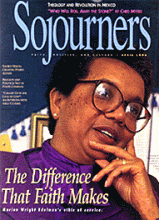What’s the difference between a political protest and organized crime? Not much, according to a Supreme Court ruling in January that many activists fear could be used as a bludgeon against advocates of unpopular causes. The high court ruled on January 24 that racketeering laws written to combat organized crime can be applied to activities of pro-life groups, even though no financial motive is present. While the Racketeer Influenced and Corrupt Organizations (RICO) law was intended as a weapon against mob crime, the court’s decision left open the question of whether RICO can be applied to nonviolent civil disobedience as well.
"Under this decision, Martin Luther King Jr. would have been a racketeer," Operation Rescue founder Randall Terry said. "What I’d say to the AIDS activists, the anti-nuclear groups, the animal-rights people, is get your affairs in order and line up, because you’re next."
Because the case involved the volatile issue of abortion—and controversial groups like Operation Rescue—some women’s groups, in suing pro-life forces under RICO, have taken a position that, according to some First Amendment activists, may come back to haunt them.
"For most feminist organizations," columnist Nat Hentoff told Sojourners, "the abortion thing is so obsessive and so blinding to everything else involved in the issue—to all the ramifications of it—that they do indeed support things that are going to boomerang and hurt them."
Meanwhile, pro-life organizers claimed to be undaunted by the decision, which sent the case back to a lower court for consideration. "We’re not racketeers and we are not going to back down from our pro-life activities," said Joseph Scheidler, executive director of the Pro-Life Action League and a subject of the RICO lawsuit. "If anything, we’ll step it up. Social protest is at the heart of what America stands for."
Read the Full Article
